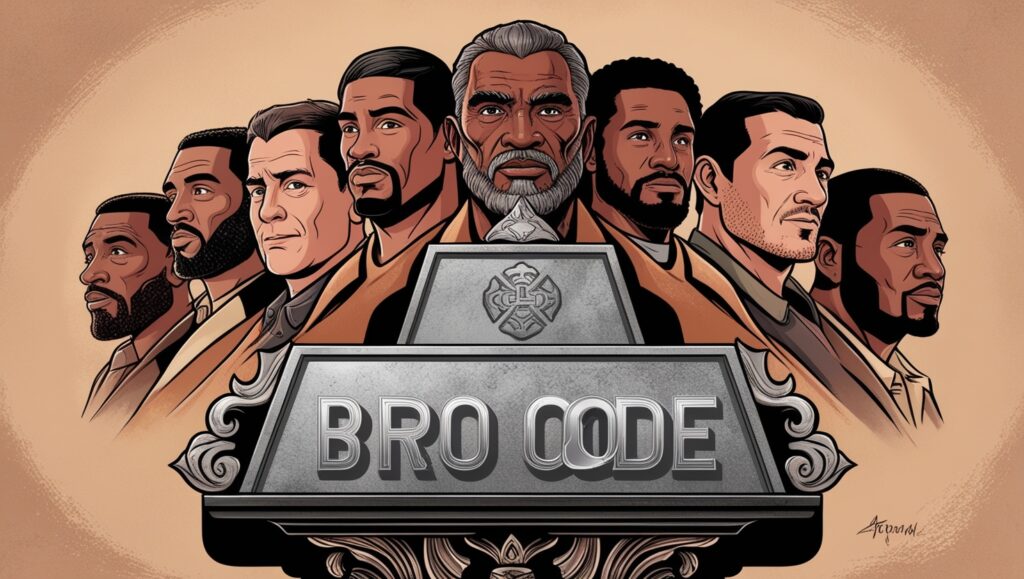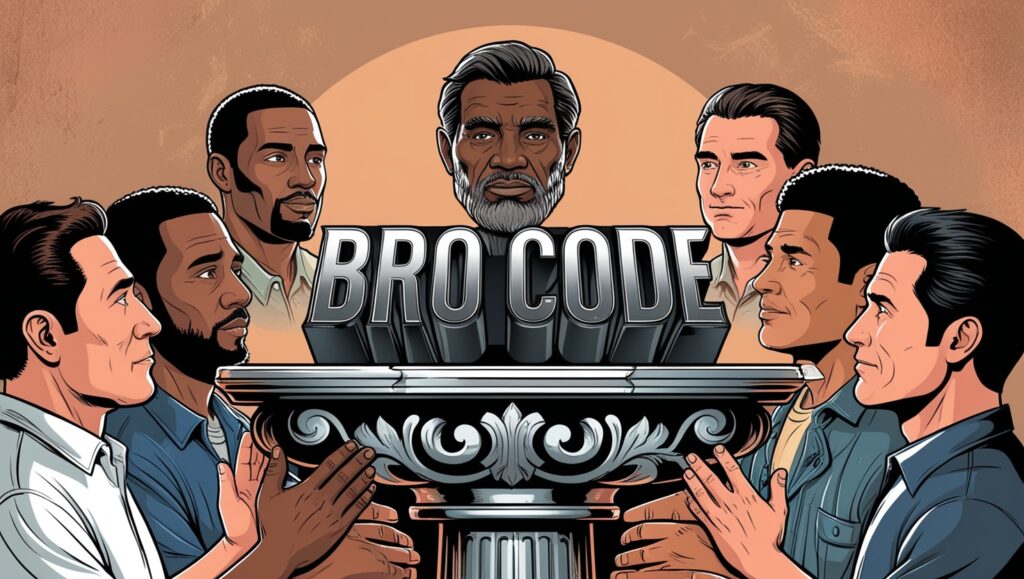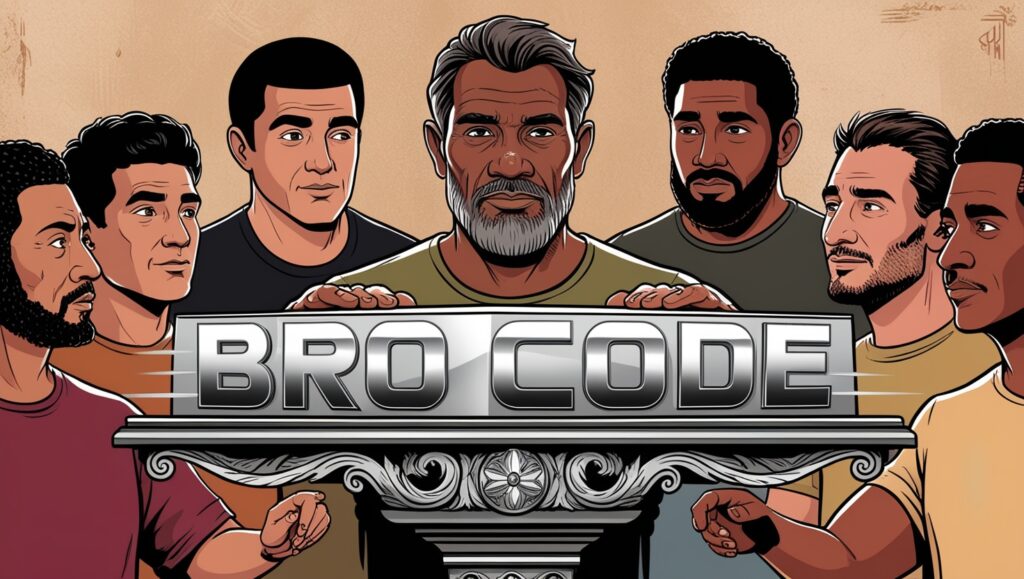In the complex tapestry of social interactions, few concepts provoke as much debate and reflection as the “bro code.” Often seen as a lighthearted set of informal rules governing friendships among men, the bro code can also reveal deeper societal structures and expectations. This article delves into why does bro code valorizes men, exploring its implications, cultural roots, and the consequences it brings to both genders.
Understanding the Bro Code
The bro code is an unwritten set of guidelines many men adhere to in their relationships. It encompasses a variety of behaviors, from loyalty to confidentiality, and often includes humorous or exaggerated rules about dating, friendship, and respect. This informal code can range from lighthearted banter to serious obligations, but at its core, it emphasizes solidarity among men.
Origins of the Bro Code
why does bro code valorizes men, influenced by cultural shifts, media portrayals, and societal norms. Its roots can be traced back to various sources, including fraternity culture, sports camaraderie, and even some aspects of popular media. Shows and films featuring male friendships often depict a hyper-masculine version of loyalty, creating a narrative that valorizes male bonds.
why does bro code valorizes men, which places high value on strength, stoicism, and competitiveness. Often glorified in society, these traits create a framework within which men navigate their friendships. The perpetuation of these ideals can lead to an unspoken agreement among men to prioritize each other’s interests, sometimes at the expense of women or broader ethical considerations.
The Valorization of Men in the Bro Code
why does bro code valorizes men. Promoting male solidarity creates a space where men feel empowered and validated in their relationships. This valorization can be observed through various facets of the bro code.

Reinforcement of Traditional Masculinity
why does bro code valorizes men. Men are often encouraged to exhibit strength and resilience, which are celebrated within the code. This creates an environment where vulnerability or emotional expression is usually discouraged, promoting a culture where men feel they must uphold specific standards to be deemed valuable.
The Importance of Loyalty
One of the primary tenets of the bro code is loyalty. Men are expected to support one another unconditionally, creating a solid bond that is often romanticized. This loyalty can lead to a sense of identity and belonging among men, reinforcing their value in social hierarchies. However, this loyalty can come at a cost, sometimes encouraging detrimental behavior, such as prioritizing male friendships over ethical considerations or the feelings of women involved.
Competition and Status
The bro code often embodies a competitive spirit, encouraging men to vie for social status and dominance within their circles. This competition can manifest in various ways, from boasting about achievements to asserting superiority over others. Such dynamics not only valorize men but also establish a hierarchy that can exclude those who do not conform to traditional masculine ideals.
Exclusion of Women
why does bro code valorizes men, it often leads to the exclusion of women from these dynamics. By valorizing male bonds, the bro code can reinforce a narrative that diminishes women’s roles in social interactions. Women are frequently viewed as outsiders, leading to their perspectives and experiences being overlooked. This exclusion can perpetuate stereotypes and contribute to a culture of misogyny.
The Impact of the Bro Code on Relationships
The bro code has far-reaching implications for both male and female relationships. Understanding these impacts can illuminate why the valorization of men through this code can be problematic.
Strain on Male Friendships
While the bro code promotes loyalty, it can also create pressure within male friendships. Men may feel compelled to conform to certain behaviors or expectations, leading to an unhealthy dynamic where authenticity is sacrificed to maintain appearances. This pressure can strain friendships and create a facade that ultimately hinders genuine connection.

Challenges in Romantic Relationships
The bro code can create barriers in romantic relationships as well. When men prioritize their friendships over their partners, it can lead to feelings of neglect or resentment. Women may feel sidelined by the bro code’s insistence on loyalty among men, leading to misunderstandings and conflicts that can jeopardize relationships.
Perpetuation of Toxic Behaviors
The bro code can also perpetuate toxic behaviors, such as objectifying women or dismissing their contributions. The expectation that men must prioritize their male friends can foster an environment where women are seen as secondary, ultimately contributing to a culture that devalues their experiences and opinions.
Cultural Influences and Media Representation
The valorization of men through the bro code is not merely a product of interpersonal relationships; it is deeply embedded in cultural narratives and media representations. These influences play a significant role in shaping perceptions of masculinity and the expectations surrounding male friendships.
Media Portrayals of Male Friendships
Television shows, movies, and social media often glorify male friendships while downplaying or ridiculing female relationships. Characters in popular culture frequently embody exaggerated versions of the bro code, celebrating loyalty while trivializing the perspectives of women. This representation reinforces that men must prioritize their friendships above all else, valorizing a narrow view of masculinity.
Impact on Youth Culture
The bro code’s influence extends to youth culture, where boys are often taught to adhere to these unwritten rules early on. As they grow, these lessons can shape their understanding of masculinity, leading to the internalization of values prioritizing male solidarity over empathy and inclusivity. This early conditioning can perpetuate cycles of toxic behavior that continue into adulthood.
The Role of Fraternity Culture
Fraternity culture has long been a breeding ground for the bro code. These organizations often celebrate exclusivity and loyalty among men, reinforcing a culture that valorizes male bonds while sidelining women. The rituals and traditions of fraternities can perpetuate harmful stereotypes and create environments where toxic behaviors thrive, ultimately impacting broader societal norms.
The Path Forward: Rethinking the Bro Code
Recognizing the valorization of men through the bro code is an essential step toward fostering healthier relationships and a more inclusive culture. Rethinking this code requires a collective effort to challenge traditional notions of masculinity and promote a more empathetic understanding of relationships.
Encouraging Emotional Vulnerability
One of the most significant shifts that can occur is encouraging emotional vulnerability among men. By fostering an environment where men feel safe to express their feelings, we can create deeper connections and break down the barriers created by the bro code. This shift can lead to healthier friendships that prioritize authenticity over conformity.
Redefining Loyalty
Reevaluating the concept of loyalty within the bro code is crucial. Loyalty should not come at the expense of ethical considerations or the well-being of others. Men can support one another while respecting their partners’ and female friends’ boundaries and needs. A more nuanced understanding of loyalty can help bridge the gap between male friendships and romantic relationships.
Promoting Inclusivity
why does bro code valorizes men, it is essential to promote inclusivity in all social dynamics. Encouraging mixed-gender friendships and fostering open dialogues between men and women can help dismantle the barriers created by the bro code. This inclusivity can lead to more prosperous, more meaningful relationships that celebrate the contributions of all individuals, regardless of gender.

Challenging Toxic Masculinity
Ultimately, addressing the valorization of men through the bro code requires a concerted effort to challenge toxic masculinity. This includes questioning societal norms that perpetuate harmful behaviors and promoting a more compassionate understanding of being a man. We can create a more equitable and inclusive society by redefining masculinity to include empathy, vulnerability, and respect for all individuals.
Conclusion
The bro code is a complex social construct that valorizes men while often sidelining women and perpetuating traditional notions of masculinity. By understanding its origins, implications, and cultural influences, we can begin to challenge the narratives that uphold these dynamics. Promoting emotional vulnerability, redefining loyalty, and fostering inclusivity are essential to creating healthier relationships and a more equitable society. As we continue to navigate the intricate landscape of human interactions, recognizing the impact of the bro code on our relationships is a crucial part of fostering a more compassionate and inclusive world.
FAQs
What is the bro code?
The bro code is an unwritten set of informal rules governing friendships among men, emphasizing loyalty, solidarity, and camaraderie.
Why is the bro code criticized?
The bro code is criticized for reinforcing traditional masculinity, promoting toxic behaviors, and often excluding women from social dynamics.
How can men redefine loyalty in their friendships?
Men can redefine loyalty by prioritizing ethical considerations and respecting their partners’ and friends’ needs and boundaries, fostering healthier relationships.
What role does the media play in perpetuating the bro code?
Media often glorifies male friendships and reinforces stereotypes about masculinity, contributing to the valorization of men through the bro code.
How can we challenge toxic masculinity associated with the bro code?
Challenging toxic masculinity involves promoting emotional vulnerability, redefining masculinity to include empathy and respect, and fostering inclusive social dynamics.


